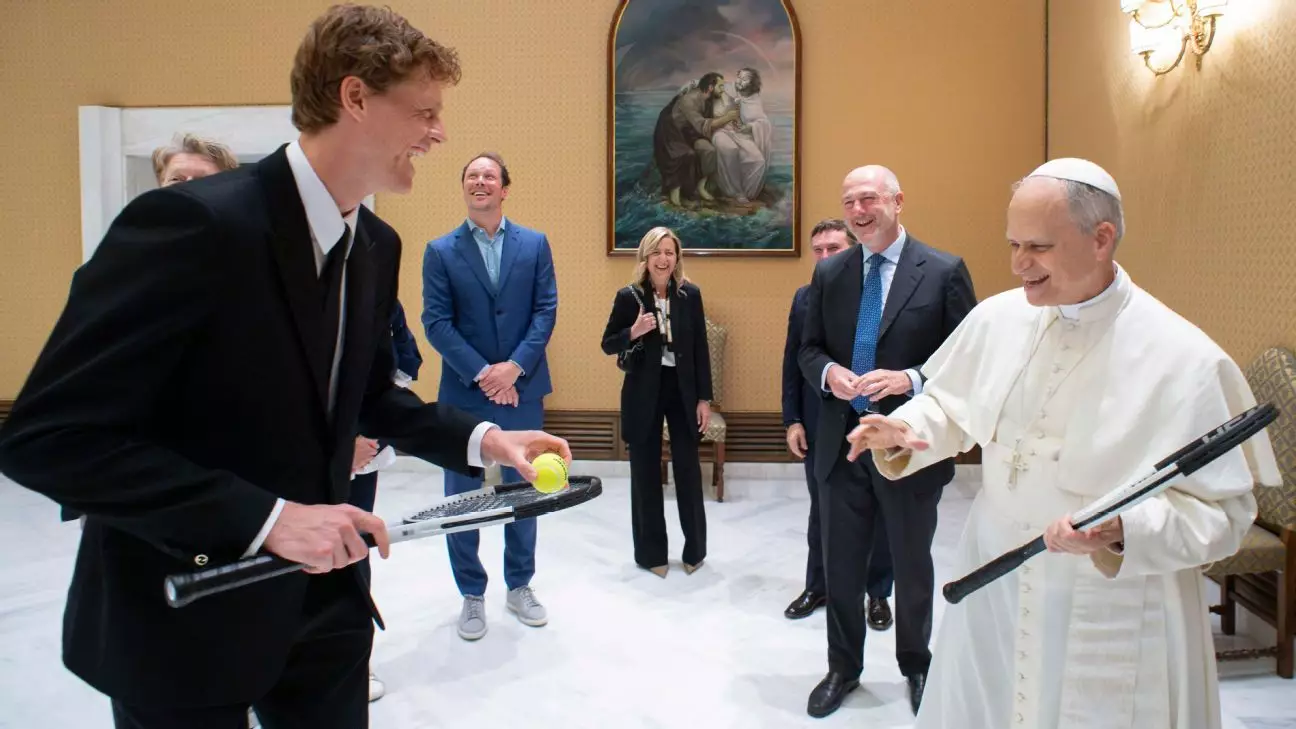In a surprising yet heartwarming encounter, Pope Leo XIV, the first American pope, met with rising tennis star Jannik Sinner at the Vatican this Wednesday. This meeting wasn’t just a chance for two figures from different realms to come together; it symbolized the intersection of faith, sportsmanship, and cultural unity. Jannik Sinner, currently at the pinnacle of men’s tennis, took a moment from his preparation for the Italian Open to engage with the new pontiff, expressing that it was “an honor” to meet the pope. The scene portrayed a blend of respect, humor, and a shared love for athletics, especially in a time when such unity is increasingly vital.
A Lighthearted Exchange
During their meeting, Sinner gifted Pope Leo XIV a tennis racket, an offering that bore significant symbolic weight. Tennis is more than a game; it is a platform for personal expression and a conduit for building connections across social divides. Interestingly, Pope Leo’s light-hearted reference to Sinner’s last name showcased a blend of humor amidst a formal interaction—an indication that the pontiff is not only a religious leader but also a relatable figure. The exchanging of banter is crucial in these situations as it softens the often rigid formality associated with ecclesiastical meetings. Sinner’s suggestion for a quick volley may have been lighthearted, but it further illustrated their shared enthusiasm for the sport, even if Pope Leo playfully declined, mindful of the Vatican’s historic artifacts.
A Shared Passion for Tennis
Pope Leo XIV’s affinity for tennis brings a refreshing dynamism to the papacy. His willingness to engage with modern sports culture indicates an openness that is often absent in traditional religious leadership. There’s a latent power in his statement regarding the possibility of a charity match, referring to tennis as a conduit for positive outreach—because let’s be honest, who wouldn’t want to see a pope in action on a tennis court? While the sport is often viewed through a commercial lens, the potential for charity work can elevate the game far beyond the confines of a mere competition.
Jannik Sinner finds himself in a unique position as he strives to become the first Italian man since Adriano Panatta to win the coveted Rome title. His ongoing journey, marked by resilience following a previous doping ban deemed as “accidental contamination,” blurs the lines between triumph and adversity—mirroring the very challenges faced in life that faith often seeks to address. The mere fact that the pope holds interest in his career can serve as a source of motivation for Sinner, reminding him that his challenges don’t define him.
Symbolism in Sporting Triumphs
The Vatican visit also allowed for a celebration of Italy’s recent achievements in tennis, highlighting the national pride embodied by Sinner and his compatriots. Standing beside the Davis Cup trophy, an emblem of Italy’s success in tennis, and the Billie Jean King Cup trophy—showcasing women’s team prowess—added layers of symbolism to their meeting. Pope Leo’s appointment as honorary member of the Italian Tennis and Padel Federation was significant, marking a harmonious relationship between sport and faith. It reflects a broader narrative: that the pursuit of excellence, whether in sports or spiritual leadership, can inspire communal pride and foster bonds transcending individual success.
In discussions about the influence of sports figures like Sinner, notable public figures often overlook the narrative. But for Sinner and his fellows, this meeting with the pope isn’t just a photo op; it’s a generational bridge connecting tradition with modernity. It also subtly nudges the cultural conversation, suggesting that faith and athletics can coexist brilliantly, infusing each realm with respect and shared passion.
Positioned at the forefront of the sport, Jannik Sinner’s dynamic youth alongside the steadfast support of Pope Leo XIV might just pave the way for a new dialogue on the positive impacts of sports on communities. As society increasingly seeks solutions to cultural divides, it’s interactions like these that remind us of the universality of the human spirit—one that celebrates achievement and camaraderie, all amidst a spirited tennis court’s backdrop.

